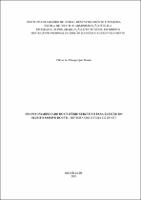Use este identificador para citar ou linkar para este item:
https://repositorio.idp.edu.br//handle/123456789/4317Registro completo de metadados
| Campo DC | Valor | Idioma |
|---|---|---|
| dc.contributor.advisor | Fernandes, Tarsila Ribeiro Marques | - |
| dc.contributor.author | Moura, Flávio de Albuquerque | - |
| dc.date.accessioned | 2023-05-05T13:48:40Z | - |
| dc.date.available | 2023-05-05T13:48:40Z | - |
| dc.date.issued | 2023 | - |
| dc.date.submitted | 2023 | - |
| dc.identifier.citation | MOURA, Flávio de Albuquerque. Do uso (in)adequado do critério subjetivo para eleição do sujeito passivo do IPTU: revisitando o tema 122 do STJ. 2023. 124 f. Dissertação (Mestrado em Direito) — Instituto Brasileiro de Ensino, Desenvolvimento e Pesquisa, Brasília, 2023. | pt_BR |
| dc.identifier.uri | https://repositorio.idp.edu.br//handle/123456789/4317 | - |
| dc.description.abstract | O objeto de pesquisa é o estudo do IPTU – Imposto Predial e Territorial Urbano, com ênfase na identificação de legitimidade dos seus sujeitos passivos. No desenvolvimento da dissertação se explorará a natureza jurídica do IPTU e sua classificação dogmática, a decomposição dos critérios da sua regra-matriz de incidência tributária, a análise dos princípios constitucionais norteadores do IPTU, com maior especificidade naqueles diretamente vinculados ao objeto da pesquisa, bem como os institutos de direito privado que qualificam os sujeitos passivos no CTN, e na legislação municipal, nesta, em quantidade por amostragem, através de critério objetivo pré-estabelecido. A pesquisa investigará ainda a promessa de compra e venda e suas acepções na doutrina, no ordenamento jurídico pátrio e nos tribunais superiores, para então ser possível enfrentar o “problema-pesquisa” , que é a análise dos fundamentos da tese fixada no Tema 122 do STJ, decorrente do julgamento em conjunto, em sede de recurso repetitivo, no ano de 2009, dos REsp n o 1.110.551-SP e REsp n o 1.111.202-SP, de relatoria do Min. Mauro Campbell Marques, que estabeleceu o promitente comprador (possuidor a qualquer título) do imóvel bem como o proprietário/promitente vendedor (aquele que tem a propriedade registrada no Registro de Imóveis) como contribuintes responsáveis pelo pagamento do IPTU em caráter solidário, bem como, que cabe à legislação municipal estabelecer o sujeito passivo do IPTU, e ao órgão de fiscalização tributária eleger o contribuinte, segundo o critério subjetivo de maior facilitação da arrecadação. Ao final da pesquisa serão visualizados os signos formadores do Tema 122 do STJ, possibilitando uma revisitação dos seus fundamentos, e abstraindo a percepção sobre o uso (In)adequado do critério subjetivo para eleição do sujeito passivo do IPTU. O método da pesquisa será bibliográfico e comparativo de jurisprudências, apenas no STJ e STF, com o corte temporal entre 2009 e agosto de 2022. | pt_BR |
| dc.description.abstract | The object of research is the study of the IPTU – Urban Property and Land Tax, with emphasis on identifying the legitimacy of its taxpayers. In the development of the dissertation, the legal nature of the IPTU and its dogmatic classification will be explored, the decomposition of the criteria of its matrix rule of tax incidence, the analysis of the constitutional principles guiding the IPTU, with greater specificity in those directly linked to the object of the research, as well as as the institutes of private law that qualify the taxpayers in the CTN, and in the municipal legislation, in this, in quantity by sampling, through pre-established objective criteria. The research will also investigate the promise of purchase and sale and its meanings in the doctrine, in the national legal system and in the superior courts, so that it will be possible to face the “research-problem”, which is the analysis of the foundations of the thesis set in Theme 122 of the STJ, resulting from the joint judgment, in the context of a repetitive appeal, in the year 2009, of the REsp no 1.110.551-SP and REsp no 1.111.202-SP, of the rapporteur of the Min. Mauro Campbell Marques, who established the promissory buyer (possessor in any capacity) of the property as well as the owner/promissory seller (the one who has the property registered in the Property Registry) as taxpayers liable for the payment of IPTU in solidarity, as well as, that it is up to municipal legislation to establish the IPTU taxable person, and to the tax inspection body to elect the taxpayer, according to the subjective criterion of greater facilitation of collection. At the end of the research, the forming signs of Theme 122 of the STJ will be visualized, allowing a revisitation of its fundamentals, and abstracting the perception about the (In)adequate use of the subjective criterion for the election of the IPTU taxable person. The research method will be bibliographic and comparative of jurisprudence, only in the STJ and STF, with the time cut between 2009 and August 2022. | pt_BR |
| dc.language.iso | por | pt_BR |
| dc.publisher | Instituto Brasileiro de Ensino, Desenvolvimento e Pesquisa | pt_BR |
| dc.rights | Open Access | pt_BR |
| dc.subject | IPTU – Imposto Predial e Territorial Urbano | pt_BR |
| dc.subject | Sujeito Passivo | pt_BR |
| dc.subject | Regra-matriz | pt_BR |
| dc.subject | Promessa de Compra e Venda | pt_BR |
| dc.subject | Tema 122 do STJ | pt_BR |
| dc.title | Do uso (in)adequado do critério subjetivo para eleição do sujeito passivo do IPTU: revisitando o tema 122 do STJ | pt_BR |
| dc.type | Tese de mestrado | pt_BR |
| dc.location.country | BRA | pt_BR |
| Aparece nas coleções: | Mestrado Profissional em Direito Econômico e Desenvolvimento - Brasília | |
Arquivos associados a este item:
| Arquivo | Descrição | Tamanho | Formato | |
|---|---|---|---|---|
| DISSERTACAO_Flávio de Albuquerque Moura_MESTRADO DIR_2023.pdf | 1.38 MB | Adobe PDF |  Visualizar/Abrir |
Os itens no repositório estão protegidos por copyright, com todos os direitos reservados, salvo quando é indicado o contrário.
